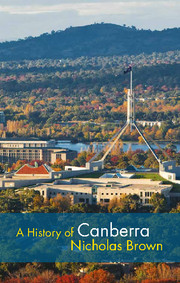3 - A document of Australian immaturity
Published online by Cambridge University Press: 05 July 2014
Summary
A NORMAL LIFE
At the beginning of the 1920s Canberra had stalled to such an extent that, at this point more than any other, it might conceivably have been abandoned. No buildings associated with housing government on the Limestone Plains were yet on drawing boards, let alone on the ground. No officials charged with those tasks had moved from the comforts of Melbourne, and certainly no politicians. Members of Parliament, and their wives and children, were offered free railway passes and lodging to visit the site in the hope that this might help overcome their prejudices against it. In 1923 one aspiring political leader, then independent member for Kooyong, John Latham, determined to ‘see the place for himself’. He returned (with specimens from the government nursery) conceding that it might be ‘a beautiful site for a beautiful city’, but the prospect of regular travel there was ‘one of the most awful things that an Australian citizen could be asked to endure in the course of a normal life’. His sentiment may betray a Victorian bias. It still begged the question: could life in Canberra ever prove ‘normal’ for those to whom the city owed its existence?
Carping had surrounded Canberra up until the outbreak of World War I, which in turn deadened appetites for an ‘ideal city’. In 1920, the population of the Federal Capital Territory (1972) continued below its pre-war levels. Reassessments even surrounded the terms in which the capital was envisaged. In 1914, Walter Burley Griffin embraced working for a nation possessing, more than any other, ‘an immediate advantage in the public control of public affairs’. By the end of the decade, ‘public control’ assumed other connotations, amid an intensification of ideological division, a scrutiny of excess in government, and a watch on the assumptions of national power that had expanded with war and needed to adjust to its legacies. Just as Canberra reflected a pre-war reformism – in the search for a healthy, improving environment and transformative concept of the city and its governance – so it became a testament to a new political contestation: still buoyed by modernity’s promise, it would also be weighted by new trends of political wariness, economic uncertainty and social polarisation.
- Type
- Chapter
- Information
- A History of Canberra , pp. 62 - 95Publisher: Cambridge University PressPrint publication year: 2014



